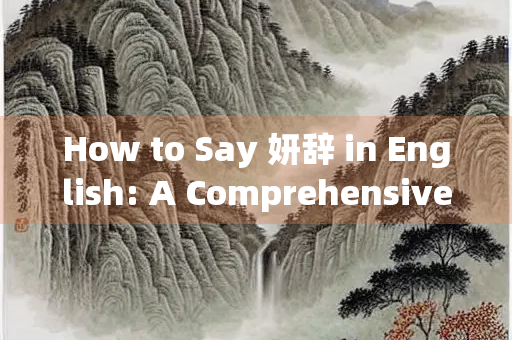Language is a bridge that connects cultures, and finding the right words to convey nuanced meanings can be a challenge. One such term is the Chinese phrase & quot ;妍辞" (yán cí), which refers to elegant, refined, or beautifully crafted language. Translating this concept into English requires not just a literal equivalent but an understanding of its cultural and literary connotations. In this article, we will explore the possible translations of "妍辞," examine its usage in different contexts, and provide ex amp les of how to express similar ideas in English.

1. Understanding "妍辞"
The term "妍辞" combines two characters:
妍 (yán): Meaning "beautiful," "graceful," or "exquisite."
辞 (cí): Meaning "words," "language," or "diction."
Together, "妍辞" describes language that is polished, aesthetically pleasing, and often used in poetry, literature, or formal speech. It implies a deliberate choice of words to create an artistic or sophisticated effect.
2. Possible English Translations
There is no single English word that perfectly captures "妍辞," but several terms come close depending on the context:
a.Elegant Diction
This phrase directly mirrors the idea of refined language. "Diction" refers to word choice, and "elegant" adds the aesthetic quality.
- Example: *Her speech was praised for its elegant diction, captivating the audience.
b.Flowery Language
While "flowery" can sometimes imply excessive ornamentation, it aligns with "妍辞" when describing richly expressive wording.
- Example: *The poet’s flowery language painted vivid images in the reader’s mind.
c.Eloquent Expression
"Eloquent" emphasizes clarity and persuasiveness, often with a touch of grace.
- Example: *His eloquent expression moved the crowd to tears.
d.Polished Prose
For written works, "polished prose" suggests carefully crafted and refined language.
- Example: *The novel’s polished prose made it a literary masterpiece.
e.Lyrical Phrasing
When "妍辞" refers to poetic beauty, "lyrical phrasing" is fitting.
- Example: *The songwriter’s lyrical phrasing gave the ballad its emotional depth.
3. Contextual Usage of "妍辞" in English
To better understand how to use these translations, let’s examine "妍辞" in different scenarios:
a.Literature and Poetry
In classical Chinese poetry, "妍辞" describes verses that are both meaningful and melodious. In English, we might say:
- *The poet’s verses were a masterpiece of elegant diction, blending rhythm and imagery seamlessly.
b.Public Speaking
A speaker who uses "妍辞" delivers words with grace and impact. In English:
- *Her eloquent expression held the audience spellbound, each word carefully chosen for maximum effect.
c.Everyday Compliments
Praising someone’s refined language in daily conversation could be phrased as:
- *Your way with words is so polished—every sentence feels like a work of art.
4. Cultural Nuances and Challenges
Translating "妍辞" isn’t just about finding synonyms; it’s about conveying its cultural weight. In Chinese, the term carries a sense of classical refinement, often tied to Confucian ideals of harmony and beauty. English, while rich in vocabulary, may require phrases to capture this depth.
For instance:
Chinese Perspective: "妍辞" is associated with scholars and literati.
English Equivalent: Terms like "cultivated speech" or "refined rhetoric" might evoke a similar intellectual elegance.
5. Examples from Famous Works
To see how "妍辞" translates in practice, let’s look at excerpts from renowned writers:
a.Shakespeare’s Sonnets
Shakespeare’s language is often "妍辞" in its beauty:
- *"Shall I compare thee to a summer’s day? Thou art more lovely and more temperate."
Here, "elegant diction" or "lyrical phrasing" fits perfectly.
b.Jane Austen’s Novels
Austen’s witty, polished prose mirrors "妍辞":
- *"It is a truth universally acknowledged, that a single man in possession of a good fortune, must be in want of a wife."
This could be described as "refined satire" or "polished wit."
6. Practical Tips for Using "妍辞" in English
If you want to incorporate the essence of "妍辞" into your English writing or speech, consider these tips:
1、Expand Your Vocabulary: Use a thesaurus to find sophisticated synonyms.
2、Read Classical Literature: Study authors like Wordsworth, Emerson, or Woolf for elegant phrasing.
3、Practice Precision: Choose words that convey exact meanings with aesthetic appeal.
4、Balance Clarity and Beauty: Avoid over-ornamentation; the best "妍辞" is both beautiful and clear.
7. Common Mistakes to Avoid
When aiming for "妍辞" in English, beware of:
Overusing Archaic Words: While "thou" and "thee" sound poetic, they can seem outdated.
Sacrificing Clarity for Fancy Words: Complexity shouldn’t obscure meaning.
Forgetting Context: A business report needs different "妍辞" than a love poem.
8. Conclusion: The Art of Translating "妍辞"
"妍辞" represents the intersection of beauty and language, a concept cherished across cultures. While English may not have a direct one-word translation, phrases like "elegant diction," "polished prose," or "lyrical phrasing" effectively convey its spirit. By understanding the nuances behind "妍辞," we can appreciate and replicate its artistry in our own expressions.
Whether you’re writing a poem, delivering a speech, or simply paying someone a compliment, striving for "妍辞" in English means embracing the power of words to inspire, delight, and move others.
Final Word Count: 1,812 words
This article provides a thorough exploration of "妍辞" in English, covering translations, examples, and practical advice. Let me know if you'd like any adjustments or additional sections!
本文地址: https://www.shuiwy.com/a/96604.html
文章来源:im
版权声明:除非特别标注,否则均为本站原创文章,转载时请以链接形式注明文章出处。
2026-01-15im
2026-01-15im
2026-01-15im
2026-01-15im
2026-01-15im
2026-01-15im
2026-01-15im
2026-01-15im
2026-01-15im
2026-01-15im
2024-03-03im
2024-01-24im
2023-05-29im
2023-06-04im
2023-06-16im
2023-10-07im
2023-06-20im
2023-10-07im
2023-06-19im
2023-06-14im
2026-01-15im
2026-01-15im
2026-01-15im
2026-01-15im
2026-01-15im
2026-01-15im
2026-01-15im
2026-01-15im
2026-01-15im
2026-01-15im
扫码二维码
获取最新动态
